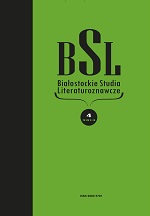Przestrzenie nomadycznych figuracji w prozie Izabeli Filipiak i Olgi Tokarczuk
Spaces of nomadic figurations in Izabela Filipiak and Olga Tokarczuk’s prose
Author(s): Monika ŚwierkoszSubject(s): Literary Texts
Published by: Wydawnictwo Uniwersytetu w Białymstoku
Keywords: space; nomadism; figuration; Izabela Filipiak; Olga Tokarczuk
Summary/Abstract: The article in an attempt at reading two contemporary Polish women’s texts (Olga Tokarczuk’s Historie ostatnie [Last Historie]/ and Izabela Filipiak’s stories Korzenie [Roots]) in the perspective of Rosi Braidotti’s nomadic theory. As analytical instruments there appear such notions as: rooting/uprooting, settling in/homelessness, desire/longing, kinship/affinity, and foremost genealogy. That last category, which, after Foucault (and Nitzsche) Braidotti perceives as a negative discourse (“continuity in discontinuity”), turns out to be a key to understanding the sense of the project of women’s cultural nomadism. The trope of the mother’s relation, which is here a metaphor of the past, with her daughter, explains in the text the ambivalence inscribed in the process of transfiguration of “a migrant” or “an outlaw” into a “nomad”. A condition of transforming a negative sense of uprooting into a positive feeling (possible but not forced) of rooting is the persona’s creation of his/her own genealogy. It takes a form of a retrospective map of the places where we are not any more.
Journal: Białostockie Studia Literaturoznawcze
- Issue Year: 2013
- Issue No: 04
- Page Range: 101-115
- Page Count: 15
- Language: Polish

